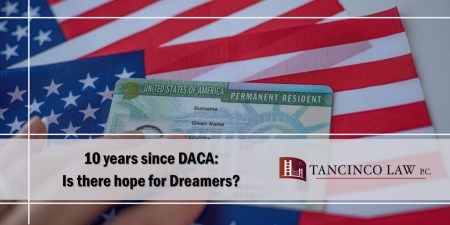It has been 10 years since President Barack Obama enacted DACA or the Deferred Action for Childhood Arrivals through an executive order.
The policy survived a Republican Administration and has been defended by the Supreme Court.
But in July 2021, a Texas court ruled the policy to be illegal. It is now under appeal while the government has been instructed to stop granting initial requests for DACA.
DACA was originally intended to only be a “stopgap measure”, but 10 years on, DACA is still not backed by any law that would allow its recipients – the Dreamers – for a path to citizenship, leaving hundreds of thousands of immigrants in limbo.
Without DACA, immigrant children who entered the United States who are now adults find it almost impossible to find work and education opportunities. They also face the threat of deportation.
President Biden should fully reinstate the DACA program and make it fairer and more accessible by modifying criteria based on age, residency, education, and past criminal activity.
What happened to legislation?
Different variations of a DREAM act have been introduced at the House and the Senate, but none have ever reached the President’s table.
Based on a 2020 Pew Research Center survey, 74% of U.S. adults say they favor a pathway to citizenship for young people brought to the U.S. illegally as children. The vast majority, 91%, of Democrats or those who are Democratic-leaning, support permanent residency for Dreamers, while 54% of Republicans or those who are Republican-leaning say the same.
But translating public support to legislation has been tricky.
President Biden himself pushed for the US Citizenship Act, which promised a path to citizenship for 11 million undocumented immigrants and their families. However, it remains stuck in Congress, and analysts say it only has a slim chance of passage unless Biden offers a compromise.
President Biden’s deadline could well be the 2024 midterm elections, which has so far been predicted to deliver an upset to his party, further trimming down the chances for his immigration policy.
What now for DREAMERS?
For young immigrant Filipino Dreamers, there is always hope that this DACA program would become legislation and would provide a pathway to citizenship. So in the meantime, for those who were able to apply prior to the District Court injunction, you can continue to renew your employment authorization documents and work legally. For students, continue to pursue your studies to completion as the government will always prioritize highly skilled or professional workers for immigrant resident visas. There are States that do not ask about legal status for students to attend post secondary education, so it is advisable to pursue their studies if they can and explore opportunities when the right time comes.
Unfortunately, those who are no longer allowed to apply for DACA because of its limited eligibility, let us continue to lobby and advocate for the passage of legislation that will either extend the coverage of DACA to benefit more DREAMERS or a legislation that will make DACA a legislation with opportunity to become U.S. citizens.
Each case is different, however. For tailored legal advice, always seek professional help from a legal counsel.
To push for legislation, call your respective lawmakers and urge them to support a Dream Act that will provide resident permanent status and citizenship to all undocumented young immigrants.


